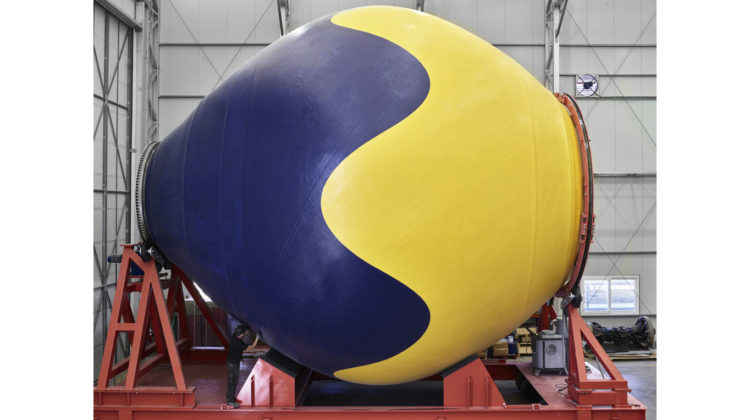
CorPower Ocean, a turnkey supplier of wave energy systems, has teamed up with composite machinery specialist Autonational and composite tank experts CPT Tankwell to successfully develop its first commercial-scale hull in Viana do Castelo, Portugal. The hull’s production marks an important milestone in the flagship HiWave-5 Project, which will involve ocean deployment in nearby Aguçadoura.
The composite hull forms an integral part of CorPower Ocean’s next generation C4 Wave Energy Converter (WEC), which was recently unveiled at a global launch event in Stockholm, Sweden.
Over the past year, process characterisation work on quarter-scale models has enabled rapid iterations and continuous tuning to reach targeted quality and material properties, paving the way for final commercial-scale construction.
‘This has been a tremendous team effort involving our specialist composite team in Portugal and Sweden with close cooperation with our local and global supply chain partners,’ said Miguel Silva, managing director of CorPower Ocean Portugal. ‘The C4 hull has been designed with a low-cost sandwich structure comprised of filament-wound composite skins for the inner and outer layer, separated by a core material. This approach brings a raft of benefits, including high strength, durability and impact resistance, combined with light weight and buoyancy-performance properties, which can withstand fatigue, slamming and impact loads. Other important features include excellent adhesion strength and chemical resistance with low water absorption.’
The hull construction has been carried out in conjunction with dry-testing of CorPower Ocean’s PTO (Power Take Off) system, using the world’s largest wave-energy test rig.
In its entirety, the composite hull development work cell consists of a fully customised filament-winding machine situated on a 14-metre-long base. This includes an automated carrying system to apply fibres onto a nine-metre-diameter mandrel, to wind the hull layer-by-layer.
‘Based on the R&D cell in Viana do Castelo, future versions of such manufacturing cells can be easily integrated in port or final-assembly facilities, amounting to “mobile factories”, said Tord Jonsson, supply chain and quality manage. ‘This will enable composite hulls to be built rapidly on customer sites, with additive manufacturing dramatically reducing lead times, cost and carbon footprint by eliminating transportation of the finished product. Delivering wave farms to our customers, we will be moving these factory cells from site to site to produce the hulls needed for a project, then move the cells over to the next customer site. The equipment will be packed and transported in three standard containers, taking only a few days to assemble once delivered to a new site. Our “mobile factory” concept enables high local content in projects, and will play a key role in revitalising local port communities and supply chains.’
Working in collaboration with several utility companies, CorPower Ocean’s first commercial-scale C4 WEC will be used to form part of a larger four-system array, and one of the world’s first wave farms generating energy to the national grid.
According to CorPower Ocean’s CEO Patrik Möller, the overall mission is to successfully introduce certified and warrantied WEC products to the market, making wave energy a bankable technology to attract mainstream renewable project finance and drive rapid deployment scale-up to address climate change.



